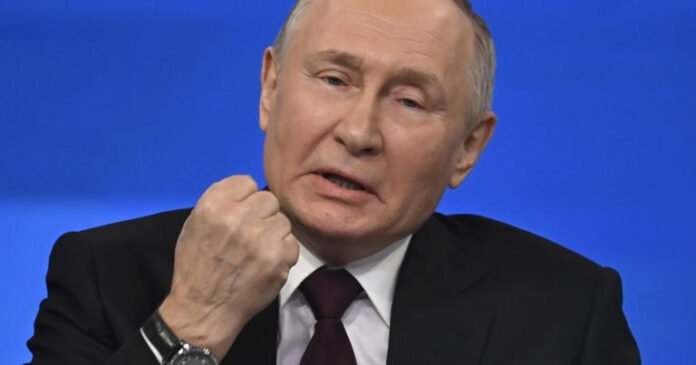President Vladimir Putin has warned of “massive devastation” in retaliation, marking a significant escalation in the ongoing tensions between Russia and its adversaries. The threat follows a recent assault on a military installation in the heart of Russia, which authorities claim was orchestrated by foreign-backed forces. The attack, which resulted in substantial damage and casualties, has prompted fears of further escalation and raised concerns about the stability of the region.
The Attack: A Strategic Strike
The attack, which took place in a key military facility in the central region of Russia, has shocked the nation. The target, a military base located in the city of Ryazan, was struck by drones or missiles in the dead of night, catching local defense forces off guard. The assault led to significant explosions and fires, leaving at least 50 soldiers dead and dozens more injured. Initial reports indicate that the attackers managed to breach the perimeter of the base, inflicting considerable damage before fleeing the scene.
Russian authorities have yet to officially confirm the details of the attack, but sources close to the government suggest that the assault was likely coordinated by Ukrainian military operatives or other foreign-backed groups. This marks one of the most daring attacks on Russian soil since the beginning of the war in Ukraine, highlighting the vulnerability of key military installations and raising alarms about the potential for more such strikes in the future.
While it is unclear who is directly responsible for the attack, the timing and precision of the operation suggest that the perpetrators had substantial intelligence on the layout and weaknesses of the Russian base. Additionally, experts believe that the use of advanced drone technology may point to increasing sophistication in the tactics employed by Russia’s adversaries.
Putin’s Retaliatory Threat
In a rare public statement, President Vladimir Putin addressed the attack, vowing to retaliate with “massive devastation” against those responsible. Speaking to an emergency session of the Russian Security Council, Putin declared that Russia would respond “swiftly and decisively” to any further aggression, warning that the consequences for attackers would be catastrophic. He further emphasized that Russia had the capability to strike back with overwhelming force, and suggested that Moscow would take an increasingly aggressive stance in its defense of the motherland.
“We will not forgive such an attack,” Putin stated. “Those who think they can attack Russia on its own soil will soon learn the price of their actions. Russia’s response will be swift, and it will be devastating.”
The Russian president’s rhetoric underscores the deep anger and frustration within the Kremlin over the assault. It also signals a willingness to escalate military operations if necessary. Analysts believe that Putin’s warning could indicate a shift toward more aggressive tactics in the ongoing conflict, possibly leading to heavier bombardments or direct attacks on Ukraine’s critical infrastructure.
The Global Reaction
The global community has reacted with a mix of concern and apprehension to Putin’s threat of massive retaliation. Western nations, including the United States and NATO allies, have condemned the attack but have stopped short of explicitly endorsing any aggressive actions against Russia. Some experts fear that an escalation of the conflict could lead to broader regional instability and further exacerbate the humanitarian crisis in Ukraine.
On the other hand, Ukraine has not officially claimed responsibility for the attack, but Ukrainian officials have hinted at their involvement, stating that “the war is coming home to Russia.” Ukrainian President Volodymyr Zelensky, in a statement, expressed solidarity with the victims of the Russian assault but also made it clear that Ukraine would continue to target Russian military assets wherever possible.
“This is a war, and we will do whatever is necessary to defend our sovereignty and protect our people,” Zelensky said. “Russia should understand that it will pay a heavy price for its aggression.”
Implications for the War
The attack on the military base in central Russia signals a potential shift in the tactics used by Ukraine and other adversaries of Russia. Until now, most of the fighting had been concentrated in eastern and southern Ukraine, with occasional attacks on Russian border towns. However, this assault inside the Russian heartland could signal the beginning of a new phase in the conflict, one that may see increased attacks on Russian soil and critical infrastructure.
For Russia, the attack represents a significant security breach and a major blow to its military and national pride. Putin’s threats of devastating retaliation may be seen as an attempt to reassert control and demonstrate that Russia will not tolerate such intrusions. However, the response could also further provoke Ukrainian forces, leading to a cycle of escalating violence and retaliation.
The Road Ahead: Escalation or Negotiation?
As the situation develops, the world is watching closely to see whether the conflict will escalate into an even more destructive phase. Putin’s threat of massive devastation, while undoubtedly alarming, also serves as a reminder of the high stakes involved in this conflict. Both sides are deeply entrenched in their positions, and the risk of a larger, more destructive war is ever-present.
Diplomatic efforts to de-escalate the situation have largely stalled, with both Russia and Ukraine maintaining hardline stances. The involvement of foreign powers, including NATO and other Western nations, continues to complicate the prospects for peace. As Putin threatens massive retaliation, the possibility of a broader regional conflict remains a significant concern for international leaders.
In the coming weeks, the world may see whether Putin’s rhetoric will lead to more military strikes or if there is room for renewed diplomatic efforts. What is clear, however, is that the war in Ukraine has entered a dangerous new phase, one that could have far-reaching consequences for global security.

